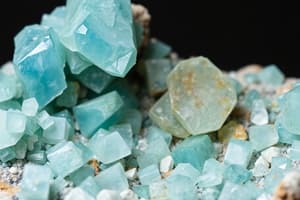Podcast
Questions and Answers
What geological factors play a critical role in determining the stability of minerals?
What geological factors play a critical role in determining the stability of minerals?
- Wind Patterns
- Chemical Composition
- Temperature and Pressure (correct)
- Biological Activity
Why are temperature and pressure considered important factors in mineral distribution across the planet?
Why are temperature and pressure considered important factors in mineral distribution across the planet?
- They affect the color of minerals
- They influence the stability of minerals (correct)
- They determine the age of minerals
- They control the shape of minerals
How do tectonic plate movements affect mineral distribution on Earth?
How do tectonic plate movements affect mineral distribution on Earth?
- By influencing wind patterns
- By creating new crust (correct)
- By changing the color of minerals
- By determining the mineral composition
Which geological factor can cause the formation of mountain ranges?
Which geological factor can cause the formation of mountain ranges?
What is the role of magmatic processes in the distribution of minerals?
What is the role of magmatic processes in the distribution of minerals?
How do hydrothermal processes contribute to the distribution of minerals?
How do hydrothermal processes contribute to the distribution of minerals?
What geological factor is responsible for creating igneous rocks rich in specific minerals?
What geological factor is responsible for creating igneous rocks rich in specific minerals?
Which process contributes to the breakdown of rocks and the release of minerals into the environment?
Which process contributes to the breakdown of rocks and the release of minerals into the environment?
How do tectonic events impact the distribution of minerals?
How do tectonic events impact the distribution of minerals?
Why are mineral deposits considered crucial for the global mining industry?
Why are mineral deposits considered crucial for the global mining industry?
Flashcards are hidden until you start studying
Study Notes
Mineral Distribution: Geological Factors
Minerals are essential building blocks for our planet. They create the foundations of our earth's crust, making up rocks and giving rise to the vast array of landscapes we see. Understanding the distribution of minerals is key to grasping the inner workings of the natural world. Let's dive into the geological factors that shape mineral distribution across our planet.
The Building Blocks of Earth
The earth's crust is a complex mosaic of minerals like silicon, oxygen, aluminum, and iron, to name a few. These fundamental building blocks are the foundation of the rocks that make up our planet's surface, and they play a pivotal role in defining its chemical composition, structure, and appearance.
Factors Influencing Mineral Distribution
The distribution of minerals is influenced by a range of complex geological factors that include:
-
Temperature and Pressure Temperature and pressure, as a function of the earth's subsurface, play a critical role in determining the stability of minerals. Different minerals have varying melting points and densities, and their distribution is linked to these properties as they move through the earth's crust in response to geological processes.
-
Tectonic Plate Movements The movement of tectonic plates, driven by convection currents in the earth's mantle, can cause the formation of mountain ranges and the generation of new crust. These processes also contribute to the distribution of minerals, as the breaking and reformation of the crust can expose new rocks and minerals to the surface, or force mineral-rich rocks deep into the mantle.
-
Magmatic Processes The formation of magma, or molten rock, and the subsequent cooling and crystallization of magma can cause minerals to precipitate and be deposited in specific locations. This process, known as magmatism, can lead to the formation of igneous rocks, which are rich in specific minerals and help to shape the earth's crust.
-
Hydrothermal Processes Hot mineral-rich fluids can circulate through the earth's crust, depositing minerals in specific locations. These hydrothermal systems can lead to the formation of mineral deposits, such as those found in hot springs or geysers, and contribute to the distribution of minerals across the earth's surface.
-
Climate and Weathering Climate and weathering processes, including erosion and the movement of water, can cause the breakdown of rocks and the subsequent release of minerals into the environment. These processes can scatter minerals across the landscape and contribute to their distribution and discovery.
-
Tectonic Events Tectonic events, such as earthquakes, volcanic eruptions, and continental collisions, can redistribute minerals across the earth's surface. These events can create new mineral resources, as well as destroy and disperse existing ones.
The Lure of Mineral Deposits
Mineral deposits, formed through these geological processes, are the backbone of the global mining industry, providing valuable resources for industries such as construction, manufacturing, and technology. Understanding the factors that shape mineral distribution is crucial for the discovery of new deposits and the sustainable management of existing ones.
By studying the complex relationships between geological factors and mineral distribution, we can better understand our planet's past, present, and future, and continue to harness the earth's mineral resources for the benefit of humanity.
Studying That Suits You
Use AI to generate personalized quizzes and flashcards to suit your learning preferences.




